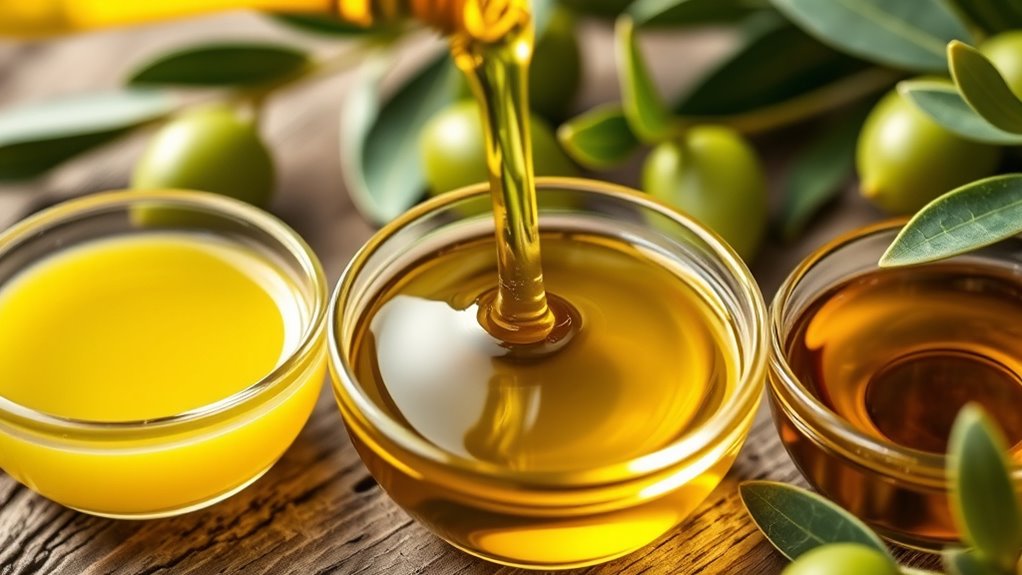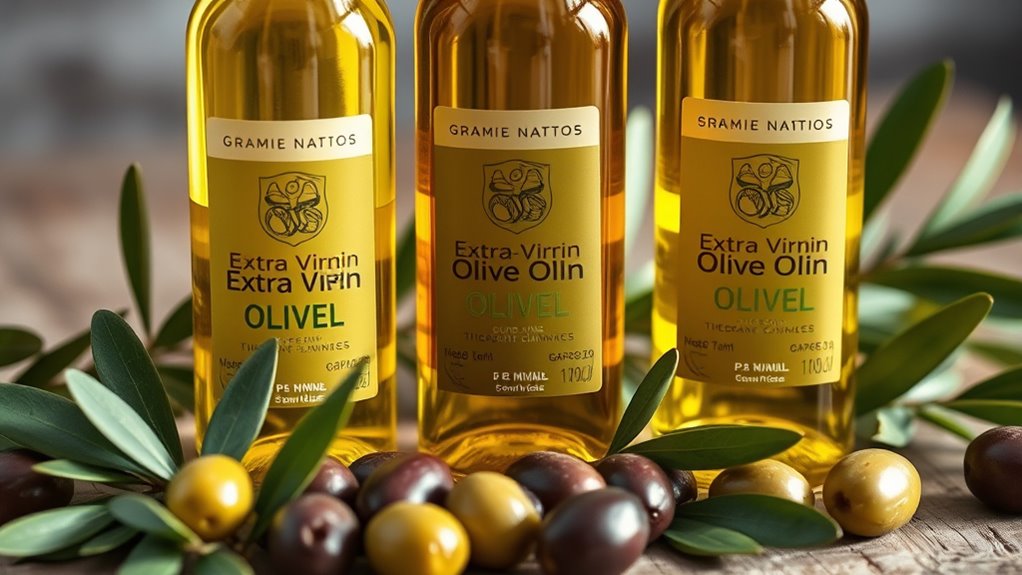Higher-grade extra-virgin olive oils contain more antioxidants and a better balance of healthy fats, which can boost your overall health. They often have higher polyphenol levels, helping to fight free radicals and support your heart. Choosing top-quality EVOO also means you’re getting fewer processed or adulterated oils with diminished nutrients. If you want to understand more about how different grades affect your health, there’s plenty more to explore.
Key Takeaways
- Higher-grade EVOO contains more antioxidants like polyphenols, enhancing its nutritional and health benefits.
- Extra-virgin classification indicates minimal processing, preserving beneficial fatty acids and natural nutrients.
- Superior EVOO grades have a balanced fatty acid profile, supporting cardiovascular health.
- Lower-grade or refined oils often have diminished antioxidant content and nutritional value.
- Selecting high-quality EVOO maximizes health benefits from its nutrient-rich composition.

Understanding the nutritional impact of different extra-virgin olive oil (EVOO) grades is essential because not all oils offer the same health benefits. The grade of EVOO directly influences its nutrient composition, particularly its levels of olive oil antioxidants and fatty acid profiles. These components determine how effectively the oil can support your health, from reducing inflammation to protecting against oxidative stress. High-quality EVOO, such as those labeled as “extra-virgin,” typically contains higher concentrations of antioxidants like polyphenols, which combat free radicals. These antioxidants are critical because they help prevent cell damage and may lower your risk of chronic diseases. When choosing an EVOO, understanding its antioxidant content can guide you toward options that offer superior health benefits.
High-quality EVOO is richer in antioxidants and beneficial fats, boosting your health potential.
The fatty acid profile is equally significant in assessing the nutritional value of your olive oil. Extra-virgin olive oils with a balanced composition of monounsaturated and polyunsaturated fats are known for their heart-healthy properties. Monounsaturated fats, predominantly oleic acid, are linked to improved cholesterol levels and reduced inflammation. Oils with a richer profile of these beneficial fats tend to be of higher grade and are more effective in supporting cardiovascular health. Conversely, lower-grade oils may have altered fatty acid profiles due to processing or degradation, which can diminish their health-promoting qualities.
As you explore different EVOO grades, pay close attention to labels and certifications. High-grade oils often undergo minimal processing, preserving their natural antioxidants and maintaining a favorable fatty acid profile. This means you’ll get a product that not only tastes better but also offers the maximum nutritional benefits. Conversely, lower-grade oils might have reduced antioxidant levels due to refining or adulteration, making them less effective for health purposes. Recognizing these differences helps you make informed choices that align with your health goals.
Incorporating higher-grade EVOO into your diet means you’re likely to consume more beneficial antioxidants and maintain a healthier fatty acid balance. These factors work synergistically to support your heart, reduce inflammation, and provide antioxidant protection. By understanding how different grades impact these key nutrients, you can prioritize quality over quantity and enjoy the full spectrum of health benefits that extra-virgin olive oil has to offer. Remember, the nutritional impact hinges on these subtle but significant differences, so choosing the right grade makes all the difference in your overall well-being.
Frequently Asked Questions
How Does Storage Affect Olive Oil’s Nutritional Quality?
You might wonder how storage affects olive oil’s nutritional quality. Poor storage accelerates oxidation effects, which break down healthy compounds and diminish flavor. To maintain shelf stability and preserve its nutritional benefits, keep your olive oil in a cool, dark place away from light and heat. Proper storage slows oxidation, ensuring you enjoy its antioxidants and healthy fats for longer, maximizing both flavor and health benefits.
Are There Any Health Benefits Unique to Specific Olive Oil Grades?
Think of olive oil grades as a secret garden of health benefits waiting to be discovered. Higher grades, like extra-virgin, boast richer flavor profiles and more antioxidants, offering you unique health perks. The grading accuracy guarantees you get the purest, most potent oil. By choosing top grades, you’re not only savoring vibrant flavors but also opening nutritional treasures that can boost your overall well-being.
Can Olive Oil Grades Influence Calorie Content in Diet Plans?
When considering olive oil labeling, you might wonder if grades affect caloric variations in your diet. While higher-quality grades like extra-virgin tend to have slightly more nutrients, their calorie content remains fairly consistent across types. The labeling doesn’t substantially change caloric values, so you can focus on using the oil in moderation. Ultimately, the grade influences flavor and quality more than the calorie count, helping you make informed choices.
Do Different Olive Oil Grades Contain Varying Antioxidant Levels?
You might wonder if olive oil grades affect antioxidant levels. Different grade distinctions, like extra-virgin or virgin, do influence antioxidant variations. Higher grades, such as extra-virgin, typically contain more antioxidants because they undergo less processing and retain more of the fruit’s natural compounds. So, choosing a higher grade can boost your intake of beneficial antioxidants, supporting your overall health and making your diet more nutrient-dense.
How Do Processing Methods Impact the Nutritional Profile of Olive Oils?
You might wonder how processing methods affect olive oil’s nutrition. Extraction methods, like cold pressing, preserve more antioxidants and healthy compounds, while refining processes often strip away these nutrients. When oils undergo extensive refining, they lose much of their original nutritional value. So, choosing minimally processed oils ensures you get the maximum health benefits, as extraction and refining considerably influence the oil’s nutritional profile.
Conclusion
Choosing the right grade of extra-virgin olive oil is like picking the best ingredients for a recipe—you’ll notice the difference in flavor and health benefits. Just as a splash of high-quality oil transforms your dish, using top-grade olive oil boosts your nutrition and taste. Think of it as investing in the finest paint for your masterpiece—small change for a big impact. So, pick wisely and enjoy the rich, healthy benefits every day.









